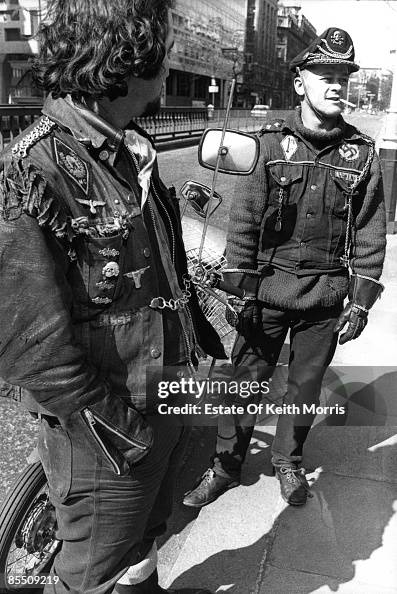A Sociological Study Of The Hells Angels

Table of Contents
The Social Structure of the Hells Angels
The Hells Angels are far from a disorganized mob; they possess a meticulously structured hierarchy. Understanding this structure is key to understanding their power and longevity.
Hierarchical Organization and Membership
The club operates with a rigid hierarchy. Membership progresses through several stages:
- Prospects: Individuals undergoing a probationary period, proving their loyalty and commitment.
- Full Members: The core membership, enjoying full rights and privileges within the club.
- Officers: Hold leadership positions within chapters, responsible for overseeing operations and enforcing rules.
- Chapter Presidents: Lead individual chapters, reporting to higher-ranking officers in the larger organization.
Initiation rites are secretive and often involve significant acts of loyalty and obedience, cementing the bond between members. Patches and insignia are crucial symbols of rank and affiliation, signifying membership and loyalty within the Hells Angels' complex social structure. The concept of "brotherhood" is central to maintaining group cohesion, fostering loyalty and mutual support amongst members. Recruitment is highly selective, prioritizing individuals who align with the club's values and are deemed trustworthy.
Territoriality and Control
The Hells Angels exert control over specific geographic territories, often through intimidation and violence. These territories serve as bases for their various criminal enterprises. "Turf wars" with rival motorcycle gangs are not uncommon, resulting in violent conflicts over territory and control. Maintaining this control involves various economic activities, including but not limited to:
- Drug trafficking: A major source of income for many chapters.
- Extortion: Forcing businesses to pay protection money.
- Illegal gambling operations: Generating profit through illicit activities.
These criminal enterprises provide resources to support the club and maintain its power. Legal challenges to their territorial claims are frequent but often prove difficult due to the secretive nature of their operations and the loyalty of their members.
The Subculture of the Hells Angels
Beyond their criminal activities, the Hells Angels possess a distinct subculture that attracts and retains members.
Values and Beliefs
The Hells Angels' ideology centers around several core values:
- Rebellion: A rejection of mainstream society and its norms.
- Masculinity: A strong emphasis on traditional notions of masculinity and toughness.
- Freedom: The pursuit of autonomy and independence.
- Brotherhood: A deep sense of loyalty and camaraderie amongst members.
Motorcycles are central to their identity, representing freedom, rebellion, and a rejection of conformity. Rituals and traditions, often steeped in symbolism, reinforce group identity and strengthen bonds among members. The outlaw biker lifestyle, perceived as exciting and rebellious, holds a significant appeal for potential recruits, fueling their expansion and continuation.
Lifestyle and Activities
The Hells Angels engage in various activities that reinforce their group identity:
- Motorcycle rallies: Large gatherings showcasing their power and uniting members.
- Social gatherings: Strengthening bonds and fostering camaraderie.
- Motorcycle runs: Demonstrating their presence and reinforcing territorial claims.
While these activities can foster a sense of community, they are often associated with violence, substance abuse, and other negative behaviors, contributing to the negative public perception of the club.
Societal Impact and Consequences
The Hells Angels' actions have far-reaching consequences on society.
Criminal Activities
The club's involvement in organized crime is well-documented:
- Drug trafficking: The distribution of illegal narcotics, fueling addiction and violence.
- Weapons smuggling: Providing access to illegal firearms, increasing crime rates.
- Extortion and racketeering: Harming businesses and individuals, undermining the rule of law.
Law enforcement agencies employ various strategies to combat these activities, including surveillance, undercover operations, and targeted prosecutions. However, the Hells Angels' hierarchical structure and secretive nature make it difficult to completely eradicate their criminal activities.
Public Perception and Media Representation
The Hells Angels are often depicted negatively in the media, perpetuating stereotypes of violence, criminality, and lawlessness. This negative representation shapes public perception, influencing public policy and law enforcement strategies. Understanding these media portrayals and their impact is crucial to fostering a more nuanced understanding of the Hells Angels phenomenon.
Conclusion: Understanding the Hells Angels Through a Sociological Lens
This sociological study of the Hells Angels reveals a complex organization with a rigid hierarchy, a unique subculture, and a significant negative impact on society. Their intricate social structure, rooted in brotherhood and territorial control, facilitates extensive criminal activities. Media representations often reinforce negative stereotypes, overshadowing the complexities of their social dynamics. Further sociological research into the Hells Angels is crucial for developing effective strategies to combat organized crime and understand the underlying social factors contributing to the existence of such groups. A deeper understanding of a sociological study of the Hells Angels is essential for addressing the complex social issues associated with this powerful organization.

Featured Posts
-
 Snl Afterparty Lady Gagas Romantic Arrival With Michael Polansky
May 25, 2025
Snl Afterparty Lady Gagas Romantic Arrival With Michael Polansky
May 25, 2025 -
 Porsche Di Indonesia Classic Art Week 2025 Perpaduan Seni Dan Mobil Klasik
May 25, 2025
Porsche Di Indonesia Classic Art Week 2025 Perpaduan Seni Dan Mobil Klasik
May 25, 2025 -
 Forgotten Motorway Burys Unbuilt M62 Relief Route
May 25, 2025
Forgotten Motorway Burys Unbuilt M62 Relief Route
May 25, 2025 -
 Gryozy Lyubvi Ili Ilicha Podrobnosti Iz Gazety Trud
May 25, 2025
Gryozy Lyubvi Ili Ilicha Podrobnosti Iz Gazety Trud
May 25, 2025 -
 Understanding Flood Risks Your Guide To Flood Safety For Severe Weather Awareness Week
May 25, 2025
Understanding Flood Risks Your Guide To Flood Safety For Severe Weather Awareness Week
May 25, 2025
